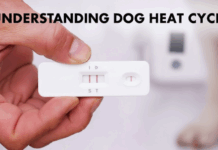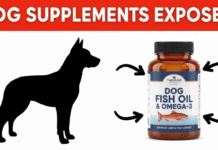Last Updated on October 6, 2024 by Dogs Vets
How CBD Oil for Dogs Can Ease Separation Anxiety
If you have a dog that suffers from separation anxiety, you know how stressful it can be for both of you.
Separation anxiety is a condition where your dog becomes anxious and distressed when you leave them alone. They may bark, whine, chew, scratch, or even try to escape. This can damage your furniture, your walls, and your relationship with your dog.
Fortunately, there is a natural remedy that may help your dog cope with separation anxiety:
CBD oil is derived from hemp, a type of cannabis plant that contains very low levels of THC, the psychoactive compound that causes a high.
CBD oil has many health benefits for humans and animals, such as reducing pain, inflammation, seizures, and anxiety.
CBD oil works by interacting with the endocannabinoid system (ECS), a network of receptors and molecules that regulates various bodily functions, such as mood, appetite, sleep, and stress response. The ECS helps maintain balance and harmony in the body.
When your dog is stressed or anxious, their ECS may become dysregulated and cause them to feel more fearful and nervous. CBD oil can help restore the balance and calm your dog down.
CBD oil for dogs is safe and legal in most countries. It does not cause any intoxication or addiction. However, you should always consult your veterinarian before giving your dog any new supplement or medication.
You should also look for high-quality CBD oil that is organic, lab-tested, and free of contaminants. You should start with a low dose and gradually increase it until you find the optimal amount for your dog.
CBD oil for dogs can ease separation anxiety by making your dog feel more relaxed and comfortable when you are away.
It can also improve their overall well-being and quality of life. If you want to try CBD oil for your dog, you can find it online or in some pet stores. You may be surprised by how much it can help your furry friend.
What is CBD oil and how does it work?
CBD oil is a liquid extract that contains cannabidiol (CBD), one of the many compounds found in the hemp plant. CBD is not psychoactive, meaning it does not make your dog high or intoxicated.
CBD interacts with the endocannabinoid system (ECS), a network of receptors and molecules that regulates various bodily functions, such as mood, pain, inflammation, appetite, and sleep. By influencing the ECS, CBD can help balance and restore the body’s natural state of homeostasis.
When your dog is anxious, their ECS may become imbalanced. CBD oil helps restore balance, encouraging relaxation and stress reduction by binding to ECS receptors and promoting a sense of calm.

How CBD Works for Separation Anxiety
When dogs suffer from separation anxiety, they can feel extreme stress when left alone. CBD oil can help by:
- Lowering cortisol levels: Cortisol is the stress hormone that spikes when your dog feels anxious. CBD can help reduce this hormone’s production.
- Boosting serotonin: CBD increases serotonin levels, which contributes to feelings of well-being and happiness.
- Calming brain regions: By modulating the amygdala (the brain’s fear center) and the hippocampus (involved in emotional regulation), CBD can help dogs feel less panicked when left alone.
Recognizing Separation Anxiety in Dogs
Although it’s more common in dogs that have been adopted or poorly socialized, separation anxiety can develop in any dog, including those that were raised in loving homes. Some common signs of separation anxiety include:
- Excessive barking or howling when left alone
- Destructive behavior such as chewing or scratching at doors and windows
- House soiling despite being trained
- Attempts to escape the house or yard
- Self-harm behaviors like licking or chewing paws
If you notice these symptoms in your dog, CBD oil may help alleviate their distress by regulating their anxiety response.
How to Use CBD Oil for Dogs with Separation Anxiety
1. Determine the Right Dosage
The correct dosage of CBD oil for dogs varies based on factors like your dog’s weight, breed, and the severity of their anxiety. A common recommendation is to start with 0.2 mg of CBD per pound of body weight. For instance, a 25-pound dog would begin with 5 mg of CBD daily. Always consult with your veterinarian before starting any new supplement regimen.
2. Administering CBD Oil
Due to its fast action, you can give this oil to the dog just before you leave the house, for example, half an hour before your departure. Of course, provide your pup with enough food, water, toys, and anything else that will entertain them while you are away.
If dogs don’t allow you to put a dropper in their mouth, don’t do it by force. You can drip the prescribed dose of CBD oil on their favorite treat or in a bowl with food. Just make sure they eat it before you go.
This method works a little slower because CBD passes through the entire digestive tract before getting into the bloodstream. That’s why it’s best to sneak CBD oil into your dog’s food an hour or two before you go out.
There are a few methods to give CBD oil to your dog:
- Direct application: Use a dropper to administer CBD oil under your dog’s tongue for faster absorption.
- In food or treats: If your dog resists direct application, mix the oil with their food or place it on a treat. Keep in mind that absorption may take longer.
3. Timing the Dosage
To help ease separation anxiety, give your dog CBD oil at least 30 minutes to an hour before you plan to leave. This will allow the oil time to take effect and calm your pet.
Benefits of CBD Oil for Dogs with Separation Anxiety
1. Promotes Relaxation
CBD oil encourages relaxation by modulating the stress response. It helps dogs feel more comfortable when alone, making it easier for them to cope with your absence.
2. Non-Intoxicating and Safe
Unlike THC, CBD does not cause intoxication, and most dogs tolerate it well. Side effects, if any, are mild and include drowsiness or dry mouth. However, it’s essential to purchase high-quality CBD oil that is organic, lab-tested, and free from harmful additives.
3. Improves Overall Well-being
In addition to easing anxiety, CBD oil offers other health benefits, such as reducing inflammation, relieving pain, and improving sleep quality. Dogs with anxiety often experience physical tension, so CBD’s anti-inflammatory properties can make them feel more comfortable.
Choosing the Best CBD Oil for Your Dog
When choosing CBD oil for your dog, look for the following key features:
- Organic: Ensure the hemp used is grown without pesticides or herbicides.
- Full-spectrum: This includes all the beneficial compounds in hemp, such as terpenes and flavonoids, which work together to enhance CBD’s effectiveness.
- Third-party lab tested: This ensures the oil is free from contaminants like heavy metals, pesticides, or solvents.
- Quality: Look for products that are third-party tested for purity and potency.
- Full-Spectrum vs. Isolate: Full-spectrum CBD contains a range of cannabinoids and may provide enhanced benefits, while CBD isolate contains only CBD.
- Flavor: Some products are flavored to make them more palatable for dogs.
So do your best to buy only genuine CBD oil for your furry buddy. The best way to do this is to choose a supplier who can provide you with quality certification and lab reports.
Also, make sure these brands and products have good reviews and testimonials from previous clients.
As seen on the following page, some signs can help you spot fake CBD products:
https://www.rd.com/article/warning-signs-cbd-product-is-fake/
Many know that CBD is one of the most powerful natural remedies available for treating a number of different medical problems in pets.
If you have a hard time dealing with your pup’s separation anxiety, hemp-based oil can be the solution you need. It’s safe, convenient, and provides great value for money.
More on CBD Oil for dogs ….
Dogs are highly emotional animals, and they just adore their humans. In most cases, they understand that their love and affection are reciprocated. Still, your pet may be too attached to certain family members. And that’s quite normal, as soon as your pup doesn’t behave strangely.
But at some point, a dog can become very anxious and depressed when their favorite person is gone.
Although this fear is unreasonable, your pet is afraid of being left alone and abandoned. This pattern of behavior is especially pronounced in adopted and poorly socialized dogs.
It’s often seen as aggressive or destructive behavior that can be very disturbing.
Have you ever given much thought to treating your pet’s anxiety with CBD oil? You may want to view more since this natural remedy can ease many health problems.
It’s even more effective at relieving your pup’s mental troubles. Besides treating a variety of illnesses, from arthritis to cancer, the benefits of this all-natural, therapeutic substance can help your pup fight stress and separation anxiety as well.
Final Thoughts: CBD Oil for Dogs Can Ease Separation Anxiety
Separation anxiety is a distressing issue for dogs and their owners. By using CBD oil, you can help your dog feel more at ease when you’re away. This natural remedy offers a gentle and effective way to manage anxiety, promote relaxation, and improve your dog’s overall well-being.
If you’re interested in trying CBD oil for your dog, start with a small dose and monitor their response. Speak to your veterinarian to ensure the right dosage and product for your dog’s needs. Over time, you may notice significant improvements in your pet’s behavior and quality of life.
FAQs:
1. How much CBD oil should I give my dog for separation anxiety?
The dosage depends on factors such as your dog’s weight and anxiety levels. Start with 0.2 mg per pound of body weight and gradually increase as needed. For a 25-pound dog, start with 5 mg per day.
2. How long does CBD oil take to work for separation anxiety?
CBD oil usually takes 15 to 60 minutes to kick in when given orally. However, dogs with severe anxiety may take longer to experience full effects, so give the oil about an hour before leaving.
3. Can CBD oil make my dog sleepy?
Some dogs may experience drowsiness as a side effect of CBD oil, especially at higher doses. If your dog seems overly lethargic, try reducing the dosage.
4. Is CBD oil safe for dogs?
Yes, CBD oil is generally safe for dogs, especially when it’s organic, lab-tested, and free from contaminants. However, always consult your vet before introducing new supplements.
5. Where can I buy CBD oil for dogs?
You can purchase CBD oil from online retailers or pet stores. Be sure to choose a reputable brand with positive reviews and third-party lab testing for purity and potency.
By incorporating CBD oil into your dog’s routine, you may help them overcome their separation anxiety and lead a happier, more relaxed life.
Fact Check
We strive to provide the latest valuable information for pet lovers with accuracy and fairness. If you would like to add to this post or advertise with us, don’t hesitate to reach us. If you see something that doesn’t look right, contact us!?
Please feel free to share this post!.


















